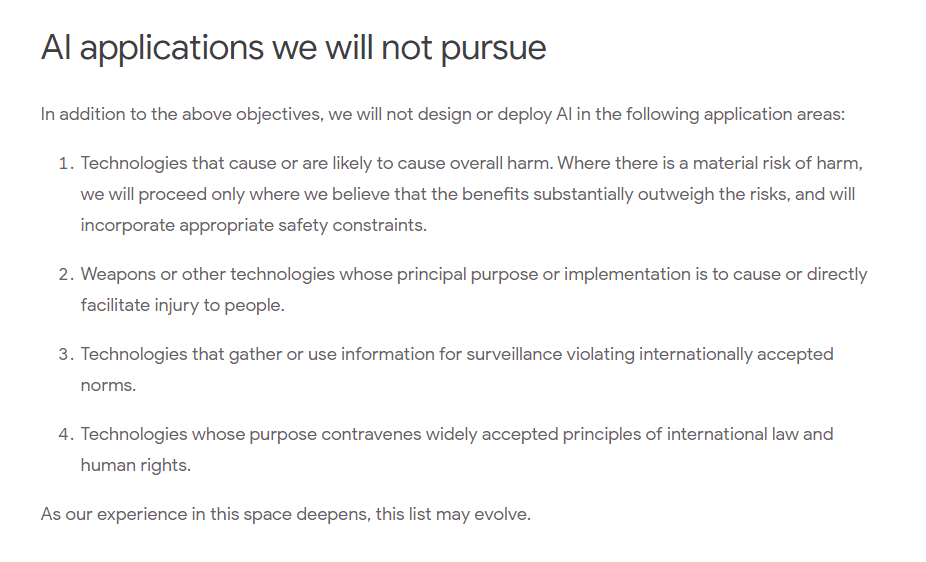The Limitations Of AI Learning: A Guide To Ethical And Effective Application

Table of Contents
Data Dependency and Bias in AI Learning
AI algorithms are heavily reliant on data for training. This data dependency is a double-edged sword. While vast amounts of data enable powerful AI systems, biased or incomplete datasets lead to biased AI outputs. This is a critical limitation, often overlooked. Algorithmic bias can perpetuate and amplify existing societal inequalities, creating unfair or discriminatory outcomes.
- Algorithmic bias can perpetuate and amplify existing societal inequalities. For example, a facial recognition system trained primarily on images of white faces may exhibit significantly higher error rates when identifying people of color. This reflects and reinforces existing societal biases.
- Lack of diverse datasets results in AI systems that perform poorly or unfairly for underrepresented groups. If an AI model for loan applications is trained on data predominantly from one socioeconomic group, it may unfairly deny loans to individuals from other backgrounds.
- Data quality is paramount; noisy, inaccurate, or irrelevant data significantly impacts AI performance. Garbage in, garbage out – this principle applies directly to AI. The quality of the training data directly determines the quality of the AI's output.
The importance of data curation and preprocessing cannot be overstated. To mitigate bias, rigorous data cleaning and augmentation techniques are essential. Data augmentation involves artificially increasing the size of a dataset by creating modified versions of existing data points. Adversarial training, another powerful technique, involves training the AI model on adversarial examples designed to expose its weaknesses and improve robustness. Keywords such as AI bias, data bias, algorithmic fairness, and machine learning bias highlight the key challenges in this area. Addressing these challenges is paramount for building fair and equitable AI systems.
The Black Box Problem and Explainability in AI
Many AI models, particularly deep learning systems, function as "black boxes," making it difficult to understand their decision-making processes. This lack of transparency, often referred to as the "black box problem," hinders trust and accountability. Understanding why an AI arrived at a specific conclusion is critical in high-stakes applications such as healthcare, finance, and criminal justice.
- Lack of transparency hinders trust and accountability. If an AI system makes a critical decision without offering an explanation, it's difficult to determine whether the decision was fair, accurate, or even legal.
- Understanding how an AI arrived at a specific conclusion is critical in high-stakes applications. In healthcare, for example, understanding the reasoning behind an AI-powered diagnosis is vital for patient safety and trust.
- Explainable AI (XAI) aims to address this issue by providing insights into AI reasoning. XAI techniques seek to make the decision-making process of AI models more transparent and understandable.
However, interpreting complex AI models remains a significant challenge. While XAI techniques are developing rapidly, they are not a perfect solution. Many XAI methods provide only partial explanations, and their effectiveness varies depending on the specific AI model and application. Keywords such as explainable AI, XAI, interpretable AI, model transparency, and black box models highlight the ongoing research and development in this crucial field.
Computational Limitations and Resource Constraints
Training sophisticated AI models requires significant computational power and energy. This often translates to high financial costs and substantial environmental impacts.
- Access to powerful hardware is often limited, creating an inequality in AI development. The high cost of GPUs and cloud computing resources makes AI development inaccessible to many researchers and organizations, exacerbating existing inequalities.
- The environmental impact of AI training should be considered. The energy consumption of training large AI models is considerable, contributing to carbon emissions and environmental concerns.
- Efficient algorithms and hardware are crucial for sustainable AI development. Research into more energy-efficient algorithms and hardware is critical for mitigating the environmental impact of AI.
The computational cost of AI training is a significant barrier to entry for many researchers and organizations. Access to powerful GPUs and cloud computing resources is often a bottleneck, creating an uneven playing field. The environmental impact of AI, often overlooked, underscores the need for more sustainable practices. Keywords like AI energy consumption, computational cost, AI hardware, and sustainable AI emphasize the need for resource-conscious approaches in AI development.
Ethical Considerations and Responsible AI Development
The ethical implications of AI are far-reaching and require careful consideration. AI systems have the potential to create significant societal impacts, both positive and negative.
- Job displacement due to automation. AI-driven automation can lead to job losses in various sectors, requiring proactive strategies for workforce retraining and adaptation.
- Privacy concerns related to data collection and use. AI systems often rely on vast amounts of data, raising concerns about privacy and data security.
- The potential for misuse of AI in surveillance and other harmful applications. AI technologies can be misused for surveillance, manipulation, and other harmful purposes.
- The need for ethical guidelines and regulations. Clear ethical guidelines and regulations are essential to ensure the responsible development and deployment of AI.
The societal impact of AI is multifaceted. Addressing concerns about job displacement, privacy violations, and the potential for malicious use requires a proactive and responsible approach. The development of ethical frameworks and guidelines is crucial for ensuring that AI benefits humanity while minimizing potential harms. Keywords like AI ethics, responsible AI, AI safety, AI governance, and AI regulation highlight the importance of proactive ethical considerations in AI development and implementation.
Conclusion
AI learning offers remarkable possibilities, but its limitations must be acknowledged and addressed proactively. Understanding the challenges related to data bias, the black box problem, computational constraints, and ethical considerations is paramount for building effective and responsible AI systems. By prioritizing data quality, promoting explainability, minimizing environmental impact, and adhering to ethical guidelines, we can harness the power of AI while mitigating its risks. Learn more about responsible AI development and overcome the limitations of AI learning to build a better future.

Featured Posts
-
 Understanding The California Transgender Student At The Heart Of Trumps Funding Threat
May 31, 2025
Understanding The California Transgender Student At The Heart Of Trumps Funding Threat
May 31, 2025 -
 Unexpected Basement Find Baffles Plumber During House Call
May 31, 2025
Unexpected Basement Find Baffles Plumber During House Call
May 31, 2025 -
 Debunking The Myth Of Ai Learning Towards Responsible Ai Practices
May 31, 2025
Debunking The Myth Of Ai Learning Towards Responsible Ai Practices
May 31, 2025 -
 Prince Died On March 26th The Fentanyl Toxicology Report
May 31, 2025
Prince Died On March 26th The Fentanyl Toxicology Report
May 31, 2025 -
 Riyadh Rematch Munguia Outpoints Surace
May 31, 2025
Riyadh Rematch Munguia Outpoints Surace
May 31, 2025
